Crusade to Make Railways Leader of Green Revolution
A parliamentary committee chairman calls for shifting road-oriented paradigm to a railways-based one
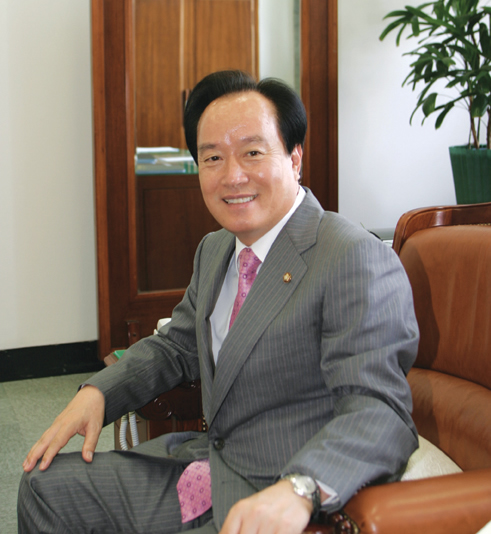 When it comes to the Korean railway industry, Lee Byung-suk, chairman of the National Assembly Land, Transport and Maritime Affairs Committee, is an ardent advocate for proliferating the domestic railways network.
When it comes to the Korean railway industry, Lee Byung-suk, chairman of the National Assembly Land, Transport and Maritime Affairs Committee, is an ardent advocate for proliferating the domestic railways network.
"Railways are an invaluable national asset for Korea, a nation without a drop of petroleum production. Railways, which have taken a back seat despite the engine of industrialization, are now gaining the public spotlight not just due to their economic efficiency, but also as the front-runner for low-carbon, green growth initiatives," Lee said in an interview with NewsWorld.
He also touched on other issues, including port policies. The following are excerpts of his interview.
Question: What's the significance of the 100 People's Declaration on Railways Forum for the coming centennial of the Korean railway industry?
Answer: "Low-carbon, green growth" is a future vision proposed by the current government. Industries and economic growth under the theme "environmental-friendliness" have become national and global agendas for Korea and other nations.
Aside from the severe impact of global warming, the 21st century needs to be an environment-oriented and green-growth era. We've awakened to the fact that mankind's past civilizations collapsed due to human-caused natural disasters. A "green revolution" ¡ª adaptation and harmonization between nature and sustainable growth ¡ª may be the mandate of our times.
Mankind has been going about at a faster pace, further and to more places to achieve prosperity, and railways have always been at the center of their activities. We need to fix our eyes on railways as channels of realizing green land, green growth and embracing each other. This is how we know that railways should stretch from the Korean Peninsula to Europe via the vast fields of China and Russia.
Railways are not just simple transportation paths for mankind and animals, but also an engine behind the environmental revolution of the 21st Century. In other words, railways amount to new paths of mankind, nature, space and communication through which the green revolution is diligently spread, and this is the reason we have to reach out to the Eurasian continent.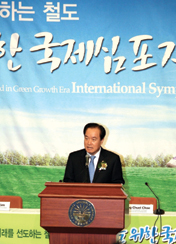
In this regard, mustering the public's concern and good will was the goal of 100 People's Declaration on Railways Forum for the coming centennial of the railways industry, which calls for legislation to improve our nation's green competitiveness, building national traffic and logistics networks and active investments in railways.
Q: Will you explain the international seminar designed to celebrate 100 People's Declaration on Railways Forum for the coming centennial of the Korean railways industry?
A: The seminar, designed to celebrate the inauguration of the 100 People's Declaration on Railways Forum, was held on Feb. 11 amid active discussions and was the follow-up of the forum's declaration, made late last year. It was significant that the seminar reminded people of the need for mounting public concern for the overlooked railway industry under the cause of green growth in pursuance with the 100 People's Declaration.
A large number of experts from Japan, China and European countries participated in the seminar to lay a foundation for future collaborations between the related parties.
I want to pin my hope on "roads." The Eurasian Railway is likely to open up the horizon for cooperation among nations. I believe that the connection of the Trans-Korea Railway (TKR) and the transcontinental railway will surely signal the start of a new civilization.
The seminar will be followed by a series of follow-up steps in the months to come. Though the detailed plans on the operation of the forum are under discussion, I want to establish a detailed, specific roadmap after discussing the direction of activities and plans. The forum promises to present the direction of railways policies and play a greater role in translating the dream of traveling along the vast continent with the hopes of making green growth and green land into a reality.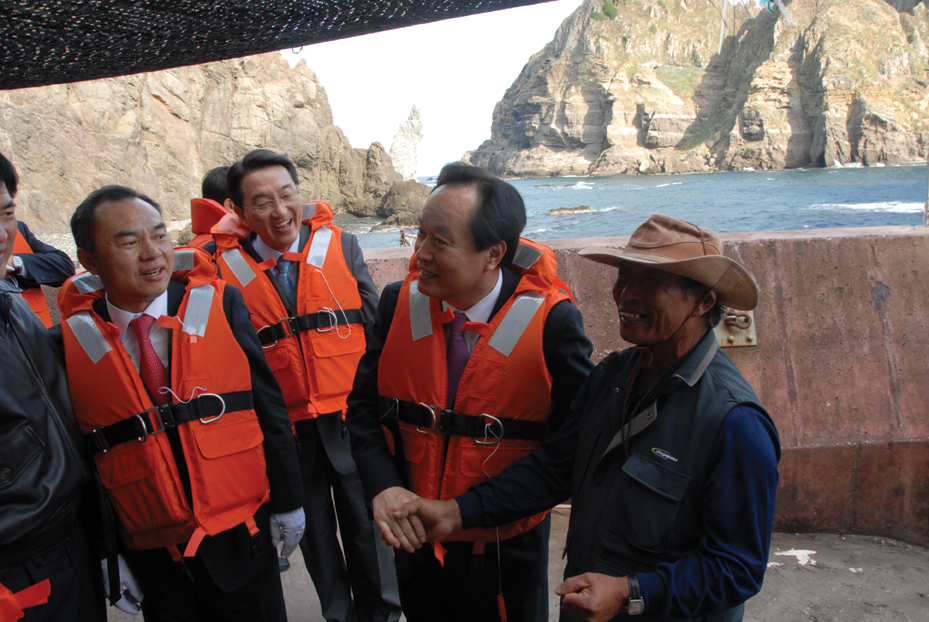
Q: Will you tell us about the current status and prospects of the Korean railways industry?
A: Despite a boost in global investments in railways, the extension of Korean railways has not made great changes in the past three decades. The extension of the Korean railways network amounted to 3,135 km in 1980, but it increased a paltry 264 km to 3,339 km in 2007. The reality of the Korean railways industry is that the extensions brings the total to 4,800 km, falling far behind the 9,065 km average for four Organization for Economic Cooperation and Development (OECD) member countries similar to Korea in size and population ¡ª Greece, the United Kingdom, Sweden and Portugal.
Railways are an invaluable national asset for Korea, a nation without a drop of petroleum production. Railways, which have taken a back seat despite the engine of industrialization, is now gaining the public spotlight not just due to their economic efficiency, but also as the front-runner for low-carbon, green growth initiatives.
The most important thing is to heavily invest in railway facilities. I cannot stress enough the importance of investing in railways, but the investments, which amounted to 3.1 trillion won in 2005, have declined to 3 trillion won in 2008. Even though the problem lies in the small size of the investments, the current investment level will take as many as 16 years to complete the ongoing projects. We can no longer hesitate. We have to pay attention to the fact that European countries emerge as logistics powerhouses by making immense investments in railways. For example, Germany invests 2.2 times as much in railways as in roads; Belgium, 5.2 times; Spain, 2 times; and the United Kingdom, 3.7 times.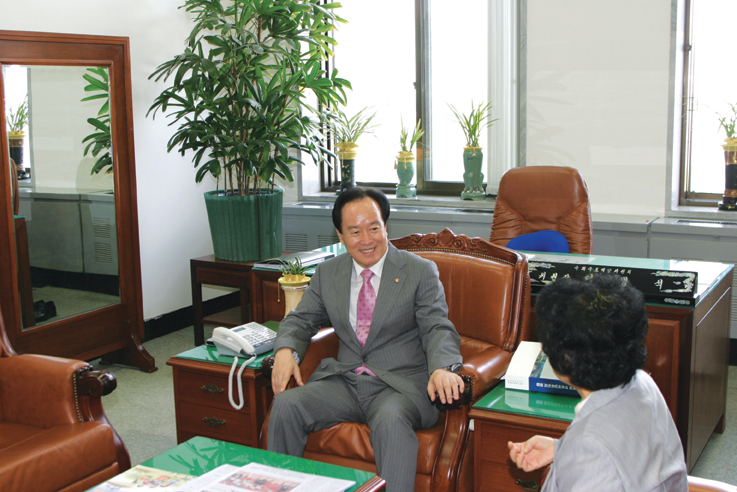
Korea needs to strengthen railways' role as a primary transportation means of the national territory: shifting the transportation of passengers and cargo to railways with government support, departing from the road-oriented transportation network system. In addition, projects to get the existing railways electrified and double-tracked need to be pushed continuously in order to expand transportation capacity.
I believe that this will surely translate into railways becoming a locomotive taking the message of the times, "low-carbon, green growth," on the road.
Q: Will you explain plans for the realization of railway policies and legislative activities?
A: The Presidential Green Growth Committee formulated the "low-carbon, green growth basic act" and presented a national management vision on sustainable development for adapting to climate change. This reflects the currents of change to an era of environmental-friendliness and low-carbon, green growth, guaranteeing mankind's sustainable development.
The direction of railways policies has already been determined. The importance of energy security in a time of crude oil price hikes and environmental disasters, caused by global warming, must be acknowledged to shift the fundamental paradigm for human civilization and industrial development. In a word, surveys show that a mere 1 percent rise in railways' transportation portion will reduce energy costs by 600 billion won yearly, and a 35 percent share could cause energy cost reductions to soar to a staggering 14 trillion won. If such things as congestion costs, climate change and the destruction of the territory are factored in, roads' social costs are about 40 times as much as railways. Let alone railways' effect of reducing greenhouse gas emissions, there is no alternative but to choose railways for those of us who live in an era of crude oil price hikes and climate change.
Another important thing in the direction of railways policies is that railways are an optimum means of enabling Korea to stretch to Europe with the goal of realizing the "Continental Dream." I have confidence that the Trans-Korea Railway's link with such railways crisscrossing vast territories of China and Russia as the Trans-Siberia Railway (TSR), the Trans-China Railway (TCR) and the Trans-Mongolia Railway (TMGR) will make the Korean Peninsula a center of the continent beyond the peninsula. It is significant that the planned Dongae Northern Line would complete the inter-Korean railway connection, thus promoting inter-Korean exchanges and communication.
In this context, I soon plan to present a bill on the expansion and utilization of railways in order to brace for the future reality. The bill would set the direction of national policies designed to boost investments in railways and improve the use of railways. In more specific terms, it would contain such topics as securing railways investment resources, building a railway linkage system, constructing railway logistics facilities, providing tax breaks for railway businesses and offering support for the railway industry's overseas entry. The measure is hoped to play an important role in strengthening national competitiveness via railways in the end.
Another bill on the development and utilization of the surroundings of railway stations will also be submitted. I will do my utmost in submitting bills on the development and growth of railways and others while serving as an active partner in working out the direction of government policies and specific strategies.
Q: What parliamentary activities do you focus on as chairman of the committee?
A: I've worked hard on the committee since late last year when I took office as the chairman of the 18th Parliament.
As you know, the committee covers the Ministry of Land, Transport and Maritime Affairs and entities related to the construction of such infrastructure as aviation, railways, roads, ports, housing and public housing sites and public services.
I put top priority on my parliamentary activities, including ones related to the chairmanship of the committee on stabilizing public lives, safety and the expansion of infrastructure for invigorating the economy.
Korea needs to focus on turning the economy around by expanding investments in such infrastructure as roads, railways and ports related to the lives of the public and improving national competitiveness in order to overcome such difficulties as the hardships of low-income earners and the slumping economy, wrought by the U.S.-sparked global economic crisis.
Q: Could you tell our readers about the direction of policies regarding the port industry?
A: The Northeast Asian region emerges as one of the world's three biggest economic spheres together with the EU and the countries of NAFTA (North American Free Trade Agreement), and Korea, China and Japan are at the center of the region. Trade volumes among the three countries account for 99 percent of the region's total, while trade exchanges among the Far East, North Korea and Mongolia take a mere 1 percent share.
The rise of Northeast Asia is owed to the rapid economic strides made by China, coupled with Korean and Japanese economic growth and recovery. North Korea, which is still mostly closed to the outside world, also plays a part due to its partial open-door economic policies. Nations in the region now maintain cooperation and competition, and this phenomenon leads to the completion of the construction of ports.
What can Korea do to make the nation a port hub of Northeast Asia, then?
Now that Korea's port development plans' focus on Busan Port and Gwangyang Port have hit the wall in a strategy to make the Korean Peninsula a port hub of Northeast Asia, the nation should develop and foster hub ports according to the national territory development axes. The government's fourth comprehensive territory plan calls for the development of port hubs by intensively investing in Busan New Port and Gwangyang Port. It also suggests the formation of the national port hierarchy through the development and expansion of regional ports and the development of hub ports in each sphere for supporting the development of the national industry. Amid the current situation in which ports of its neighboring countries grow fast, large-size hub ports are destined to suffer difficulties in spreading economic growth and development effects to its neighboring areas.
Accordingly, the hub port development plan needs to include the building of a network of existing ports and a reestablishment of systems among ports. All ports cannot become hub ports, so ports with less of a competitive edge should be developed as backwater or "bridge ports"connecting hub ports.
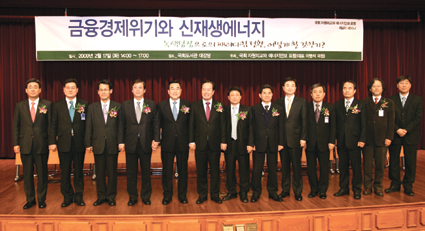
Q: You are said to have shown a keen interest in Dokdo Island, now in control by Korea, by serving as the chairman of the parliamentary ad hoc committee on the island and submitting bills related to the island. What steps should the Korean government take in order to preempt Japanese provocations over its territorial claims over it?
A: Dokdo Island is not an isolated islet far off the Korean Peninsula. The island is the space in which we make a living. We have to make Dokdo Island a full-fledged manned island in order to take a step forward from the simple control over it. People should be allowed to come freely from and to our territory we have been controlling since a long time ago.
To this end, we have to build such infrastructure as facilities for supporting island inhabitants and visitors, providing drinking water and cultivating agricultural products, infrastructure designed to secure, protect, and provide access to ships or boats, and a maritime and science survey station for monitoring weather and marine life so that people can make a living.
In an effort to have synergetic effects, the "man Dokdo Island" policy needs to be implemented simultaneously with the development of Ullung Island, including the opening of the unconnected sections of the circular road and the expansion of Sadong Port.
Currently, the Office of Government Policy Coordination is considering proposals related to the development of Ullung and Dokdo islands from government agencies. The important thing we have to do is to do it in a way that development and preservation of Ullung and Dokdo islands can be harmonized, and parliament and governments, both central and regional, and people should be reconciled and integrated.
For my part, I will do my best in legislating all related matter, and I will throw my heart and soul into providing parliamentary and policy support as the chairman of the National Assembly Land, Transport and Maritime Affairs Committee.
Q: Will you further comment on other parliamentary activities?
A: Tiding over the economic crisis is the nation's greatest task on the part of all sectors, including political circles. As a result, this year's greatest task is to push the construction of infrastructure without a hitch in order to stabilize public life and revive the moribund economy, and my job is to encourage the MLTM and other related institutions to do so.
Q: Will you tell us your political views and creeds?
A: I authored the book "Anyone who makes oneself humble, always hits the sky," containing conversations and thoughts with my constituents during my political career. The book reflects my political views and creeds.
The buzzword I want to use is "integration." In reality, many refer to public integration, social integration, or national integration. It means that they are set apart, incommunicable, or energies are wasted away. They are divided over how to find solutions, and the previous governments had gone for touting "integration," but the gap of conflicts was widened. nw
Lee Byung-suk, chairman of the National Assembly Land, Transport and Maritime Affairs Committee
Lee Byung-suk, chairman of the National Assembly Land, Transport and Maritime Affairs Committee, speaks at a symposium held at the National Assembly on Feb. 11 in celebration of the launch of the tentatively-named "100 People's Declaration on Railways Forum."
Rep.Lee Byung-suk, 2nd R, is seen on a visit to Dokdo with a number of his companions.
Chairman Lee in an interview with NewsWorld Publisher & President Elizabeth M. Oh.
(Left) Rep. Lee speaks at the symposium held at the National Assembly on Feb. 17 under the theme "Financial and Economic Crisis & New and Renewable Energy." The participants of the symposium under the theme "Financial and Economic Crisis & New and Renewable Energy."
3Fl, 292-47, Shindang 6-dong, Chung-gu, Seoul, Korea 100-456
Tel : 82-2-2235-6114 / Fax : 82-2-2235-0799